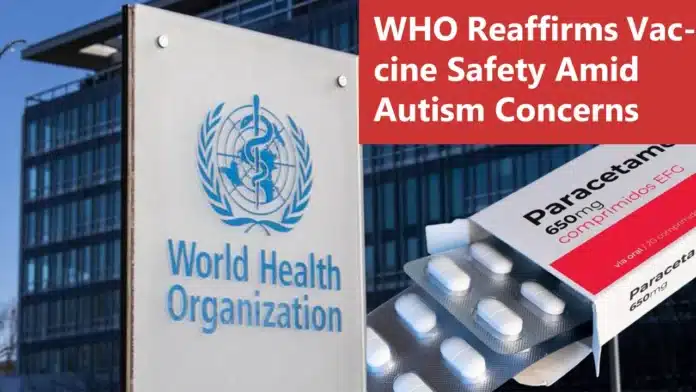WHO Clarifies Autism Not Linked to Paracetamol Use
The World Health Organization (WHO) has confirmed that there is no conclusive scientific evidence proving a link between autism and the use of acetaminophen (paracetamol) during pregnancy. While research has been ongoing for over a decade, including large-scale studies, results remain inconsistent. WHO stresses that autism has multiple contributing factors, and its causes are not fully understood. Pregnant women are urged to follow medical advice for safe medicine use.
Global Autism Prevalence and Ongoing Research
Autism spectrum disorder (ASD) currently affects around 62 million people worldwide, or 1 in 127 individuals. Increased awareness and diagnosis have improved understanding, but the condition’s exact origins remain unclear. Scientists believe that a mix of genetic and environmental influences contribute to autism. Despite extensive studies exploring possible connections to medications, including acetaminophen, WHO reiterates that no reliable evidence supports such an association. Further research is still underway globally.
WHO Guidance on Medicine Use During Pregnancy
WHO advises that pregnant women should consult health professionals before taking any medicine, especially during the first trimester. Paracetamol and other medicines should only be used when absolutely necessary and under medical supervision. Doctors and health workers can assess each case individually and recommend the safest approach. This cautious method ensures both maternal and child health while minimizing unnecessary risks during pregnancy. Responsible medical guidance remains key to safe outcomes.
Vaccines Do Not Cause Autism, Confirms WHO
In addition to clarifying on paracetamol, WHO reaffirmed that childhood vaccines are not linked to autism. Multiple high-quality studies from different countries have shown no connection between vaccines and developmental disorders. Earlier claims suggesting such links have been discredited as flawed. Since 1999, global experts advising WHO have confirmed that vaccines, including those containing thiomersal or aluminum, are safe and play a crucial role in protecting children’s health.
Global Benefits of Immunization Schedules
WHO’s childhood immunization schedule has saved an estimated 154 million lives in the last 50 years. These schedules protect children, adolescents, and adults against 30 infectious diseases. Developed with scientific evidence and international collaboration, they continue to evolve with medical advancements. Experts stress that vaccines must be delivered at the right time to ensure maximum protection. Disruptions or delays in immunization increase infection risks, especially for infants and vulnerable populations.
Risks of Altered or Delayed Vaccination
WHO warns that changing vaccine schedules without evidence-based review can sharply raise the risk of outbreaks. Infants, immunocompromised individuals, and those with chronic health conditions are particularly vulnerable when communities have low vaccination coverage. Maintaining trust in established immunization schedules is vital for public health. The collective safety of communities depends on timely vaccination, ensuring protection not only for individuals but also for those unable to receive vaccines themselves.
Autism as a Global Health Priority
Autism and other neurodevelopmental disorders are among the key mental health priorities being addressed at the 4th UN High-Level Meeting on NCDs and Mental Health. WHO acknowledges the urgent need for deeper research into autism’s causes and better support for autistic individuals and their families. Working with autistic-led organizations and advocacy groups, WHO remains committed to advancing evidence-based policies, reducing stigma, and ensuring dignity for all people living with autism.
Israel Unveils Iron Beam 450 Laser Defense: A Game-Changer in Air Security

